
Merry Crisis (Demo)
After a break-up turns your world inside out, you return home for Christmas hoping the change in scenery will give you space to mend a broken heart.
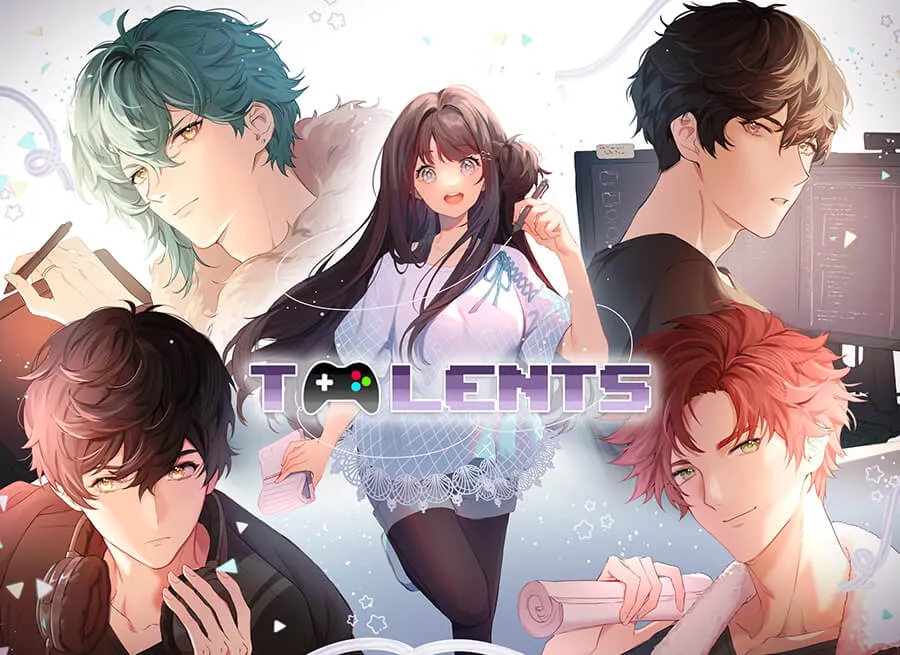
Every indie developer has a story to tell, but few share it as openly and sincerely as Izumi of Izumi Games. Her latest release, Talents is a reflection of her own journey through creativity, faith, and perseverance. The game follows a team of aspiring developers chasing their dreams, mirroring the same passion and struggle Izumi faced while bringing it to life. Through heartfelt storytelling, relatable characters, and honest glimpses into the realities of making games, Talents captures what it truly means to create something from the heart.

Izumi: “I’m Izumi, a software engineer who’s been doing game dev on the side as Izumi Games for 4 years now. Even though I work professionally in software, I also took a 9-month specialization program in game development through online learning, authorized by a real university abroad. But really, I’ve always wanted to be a game dev ever since I was 5.”
“Before starting Izumi Games, I was just a hobbyist exploring different genres and publishing short 2D and 3D games. The genre that really keeps me on my toes for hours, though, is the visual novel genre. I’ve come to love games that are heavy on storytelling—that’s why I decided to focus on that for Izumi Games. I created the brand to learn more about the commercial side of the industry (since I dream of founding my own game studio someday), but eventually I also started making free games purely for self-expression.”
“As for what inspired me to get into this industry, there were a lot of reasons. First, I’ve always wanted to make software—whether it’s a desktop app, a website, or a game. I was a heavy computer addict back in the day; for me, computers felt like magic. Second, growing up, I couldn’t afford my favorite games, which just made me want to make my own. And third (and maybe I blame GTA: San Andreas for this), I got curious about why their missions were so hard for me—so that’s how game design started to fascinate me.”
“My love for visual novels came later, from the many storytelling games that came before me. These are the kinds of games that really stay with you—introducing you to new worlds, relatable characters, and meaningful lessons, all while letting you actually be part of the story. Like my logline says, I want my stories to meet your soul, and hopefully, even in a small way, leave a mark.”
“Of course, there were lots of challenges: skills, budget, self-preservation, and the courage to write from a vulnerable place. The most consistent struggle, though, has been the art. I can’t draw well, so I usually commission artists for my projects. I’ve made a few games with my own art, but it never quite met my standards for commercial releases. Art takes time and practice—but when you’re a solo dev juggling everything else, time becomes a luxury. Being a solo dev means being a jack-of-all-trades. So, if you’re aiming for the stars, it’s okay to ask someone to help build the rocket with you.”
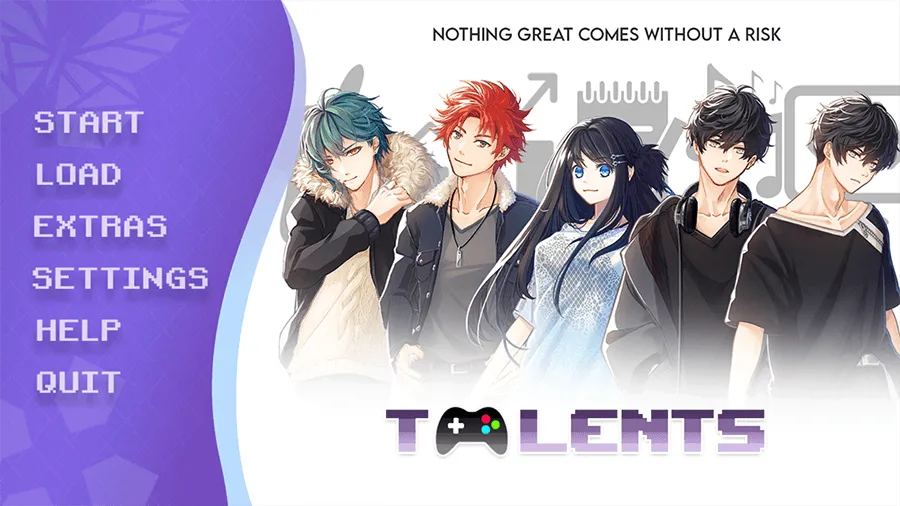

Izumi: “This is where self-preservation comes in. How do you stay sane when you have a full-time job and still make an indie game all by yourself? When I first started, it wasn’t balanced at all. I worked on my game every night, even when I barely rested. Heck, even when I was sick, I was still writing He@rtstrings.”
“As a breadwinner, I’m very prone to stress and burnout. I used to take everything so seriously—there was no time to waste, or so I thought. That changed around the time I released the Snowman visual novel. I made about 90% of the art myself and still managed to submit it for a game jam. Through that project, I realized the importance of pacing yourself and trusting that things will fall into place when they’re meant to.”
“That’s also why I started my next project, Talents, even knowing it would take two years to make. Why two years, when I just said to take my time? Well, commercial releases are a different story. Project management becomes key if you want to actually finish. But this time, I’ve allowed myself more breaks and set a lighter work schedule. I’ve given myself grace to write at my own pace—without rushing, just creating.”
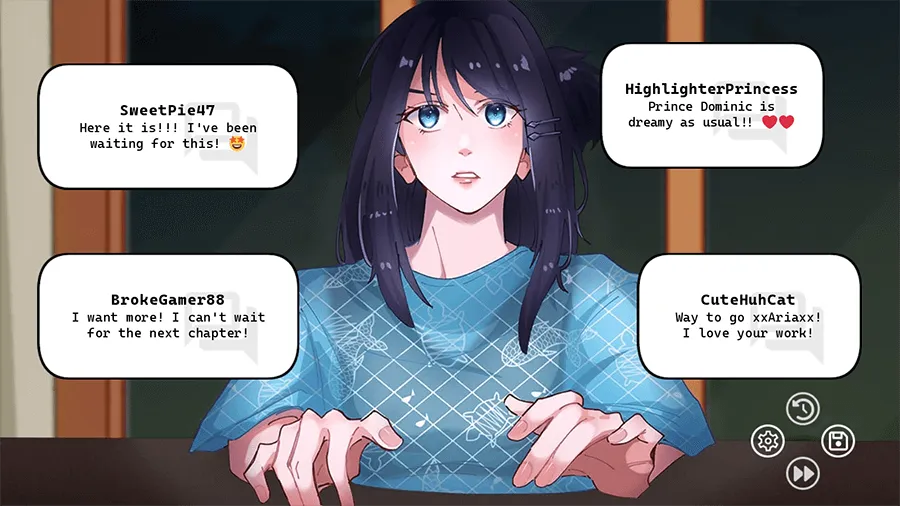

Izumi: “Talents is an otome visual novel where you make games alongside your love interests in a game development startup. It’s your job to write these games well and succeed both in the industry—and in love.”
“The game features six routes, 50+ CGs, 19 endings, and a writing skill event and choice-based gameplay system. Each route includes both technical and character-related dramas unique to each love interest and their field of expertise.”
“Your goal is to progress through each level (story arc) by improving your writing skill and making choices that raise your love interest’s affection. Your skill level and decisions will shape your ending—whether it’s bad, normal, or good.”
“We highly recommend exploring all routes and endings to earn achievements and complete the lore.”


Izumi: “There were a lot. I’ve talked about this in my devlogs and in other interviews as well. First, my personal life; then my interest in startups; media that focuses on characters and friendship rather than just romance or plot; the writing style of some Korean dramas; the people I’ve met—both online and offline—who shared their own game dev journeys; and finally, the state of the game industry, both globally and locally.”
“You see, I’ve always been business-minded. When I make a commercial game, it’s usually because there’s a problem I want to solve. I wanted to enter the game dev industry professionally, but with all the layoffs, the lack of hiring local studios, underpaid talents, and ongoing economic struggles, it’s tough. So, I hope this game inspires others to create their own reality—to pursue their dreams without waiting for anyone’s permission. If you can’t find an opportunity, make one.”
“Actually, the game’s vision even caught the attention of a senator during one of the events I attended. We talked about the challenges our country faces in the industry and how my game might inspire people to start addressing them.”
“The game carries real-world lessons you can apply beyond the screen. It’s an educational game mixed with romance fantasies, slice-of-life comedy, and personal dreams.”
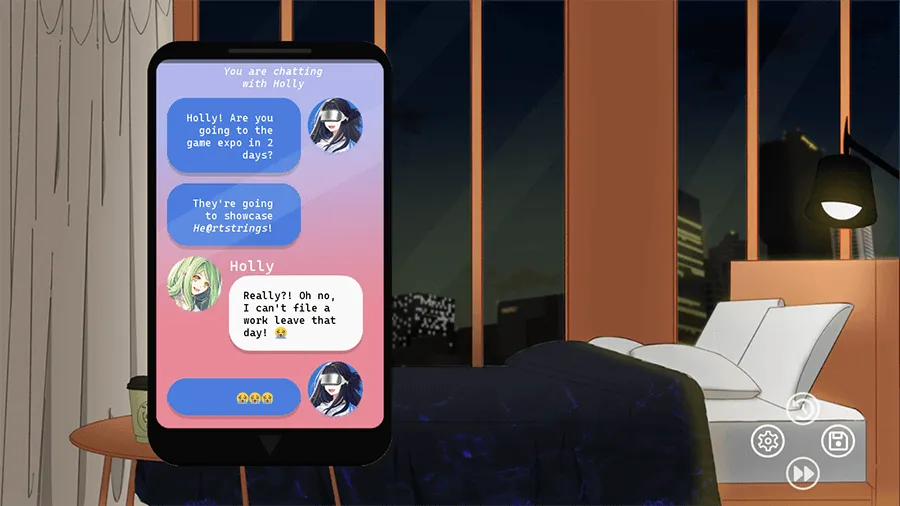

Izumi: “There’s a scene in Talents, on Kris’ route, where Alice finds him asleep in front of his PC. On the screen are plans for everything, including notes about each team member’s financial situation. For example, he structures milestones based on their current savings, or even offers Alice a place to stay if she’s struggling with rent.”
“The first inspiration for this was actually my boss from my day job. He was that kind of person (props to him). That’s what inspired the “live-in offer” scene in the demo. The second inspiration came from Kimberly Rodatos, one of the founders of Digital Owl Studios. She previously worked on AAA titles like Far Cry and with companies like Epic Games. During my interview with her at Gamedev Summit 2024, she mentioned that her biggest challenge as a studio head was figuring out how to pay her employees.”
“Those experiences made me realize that people who carry that kind of responsibility and empathy truly deserve to be leaders. That’s why I added the “Kris sleeping at his PC” CG scene in the full game, to capture that quiet kind of care and dedication.”

Izumi: “That one was easy. I mirrored her to myself. I made it as personal and descriptive as possible, but the difference is that Alice is more positive and knows how to communicate her thoughts, even if it means arguing with someone. She’s the kind of communicator I’ve always wanted to be in real life.”
“In reality, I’d usually just stay quiet and overthink instead of expressing how I feel. I’m glad that through writing her character, she ended up inspiring me, too—to do better and speak up more.”

Izumi: “While they’re all equal to me, as I see them like my own children, if we’re talking about the writing process, that would be Harry’s route. His character was inspired by someone I know personally, and his story has the lightest conflict among them. Because of that, I was able to explore more of the romcom side. Flirty characters are my weakness, so that played a big part too.”
“I also think I enjoyed writing his route more because my mind was in a better place at the time compared to when I wrote the others. As a writer, my state of mind and emotions always reflect in my work. Personal struggles affect my pacing, my creativity, and even how the characters speak. I was laughing a lot while writing Harry’s scenes, so his route ended up being filled with positivity.”


Izumi: “Kris Silvan was actually my first male original character when I started my fiction writing journey. He originally appeared in an unpublished Filipino novel I wrote, where he was a dancer, and the story centered around the childhood friend trope. In Talents, he’s now Alice’s (the MC’s) childhood friend.”
“That’s also why his first scene includes him dancing on the DDR machine in the prologue. Since he was a dancer in my old novel, I wanted to carry that part of him into Talents too. In the story, Alice hasn’t seen him for the last eight years until they meet again in the prologue. That sudden ghosting of his has a reason.”
“His route is full of spoilers, which is why I recommend doing his route last. Kris may seem easygoing and dependable, but he actually has the darkest story among all the love interests. I highly recommend exploring his bad endings—some of them are my personal favorites.”
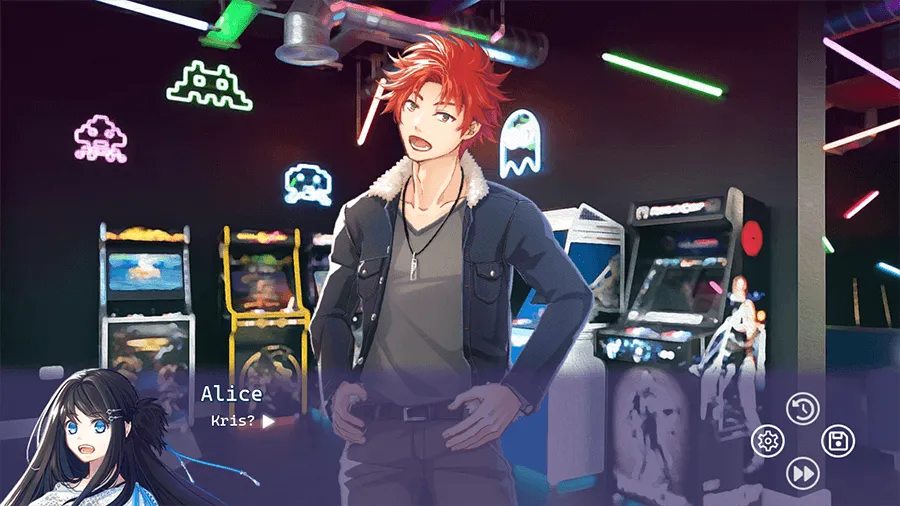

Izumi: “Originally, Souma and Sousuke weren’t supposed to be twins. They were meant to be just normal brothers, with Souma as the older one. Their personalities were also completely different. However, someone on Twitter pointed out how identical they looked—something I honestly didn’t notice when I purchased their character designs from their original creator, Kuroaya Craft. So, I ended up tweaking the story. I mean, I thought they looked similar, but not that identical.”
“Their stories share a similar theme, but Sousuke’s route focuses more on personal struggles, while Souma’s on the technical-related drama. Souma’s story leans toward romcom, while Sousuke’s explores the more realistic side of relationships. Each route is sure to cater to whatever you’re craving.”


Izumi: “There’s a reason why he’s like that. Even in the demo, it’s hinted that Harry lost his spark when it comes to his dreams. And as someone who’s now in the same position as him, I try my best to stay positive and carefree, so that definitely influenced his character. But if you play his route in the full game, you’ll see that he wasn’t always like this. Like the other love interests, this prince also carries a dark past. It’s up to you to uncover it and see if you can help him find his dream again.”

Izumi: “For the choices, they’re mainly based on each love interest’s personality and how well the player thinks through the possible consequences of every decision. As for the skill checks, even though each level has different rules, they all focus on testing your English vocabulary. Alice is a game writer who writes for all the games within the game. We also added a dictionary feature, so the entire game carries a writer theme. The minigame was originally planned to be a typing game, but since that didn’t feel quite right for a visual novel, I had to come up with a mechanic that still feels true to the idea of being a writer. Doki-doki Literature Club was an inspiration to that as the game also includes writing, but for poems. I innovated the mechanic and added more complexity for Talents’ game design.”


Izumi: “Actually, I based it all on budget. First of all, I can’t draw, and I can only do basic digital coloring. In the first version of the demo, I handled the coloring myself, while Ysa-sensei, my go-to lineart artist for all of my games, did the lineart. The sprites were purchased from Kuroaya Craft. These characters are stock assets, so they’ve already been used by other people in Japan for different projects. But since I hadn’t seen them used outside of Japan yet, I decided to take the chance, asked for permission, and thankfully, the artist had favorable terms for their work. Purchasing these characters was much cheaper than commissioning new ones from scratch, so budget definitely played the biggest role in my decision.”
“During the first version, I tried my best to match Kuroaya’s coloring style, but I eventually found the workload too heavy. When we decided to move forward with the full game, I brought in another artist to handle the CG coloring. I scouted someone whose style closely matched Kuroaya’s, while I focused on background art, extra touch-ups for CGs, additional graphics, and other development tasks. There were even times when we had to change the sprites’ outfits, and I’m thankful I found an artist who could handle that for me too.”
“The key art was actually a gift from Hanabiem, and I’ll always be grateful for that. The chibi and merchandise art were done by a friend who kindly helped out. Looking back, the whole project was truly a collaborative effort and a matter of grace from the Lord. I know for sure that with my skills and budget alone, I couldn’t have done it by myself.”
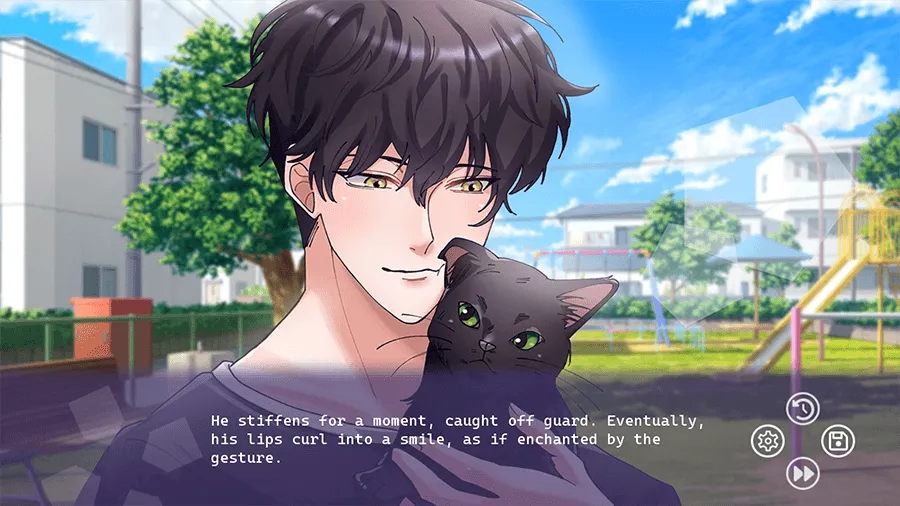

Izumi: “Not at all. Meagan, the voice director and the voice of Alice, helped me with the casting. We held auditions for the other characters in-house at their studio, choosing from their roster of voice actors. Meagan had played the demo and understood the characters well, so she did a great job handling both the casting and direction.”

Izumi: “The feedback was great. While some players mentioned pacing issues, I rarely saw anyone who didn’t enjoy it. Most of them actually wanted more content, but the routes’ scopes were fixed from the start. I didn’t include a dating stage or post-confession scenes (except for the timeskip endings), because as someone with no dating experience, I didn’t want to write something I couldn’t represent properly. Some conflicts were also resolved quickly for the same reason.”
“Each person’s experience should be recognized and respected. As a writer, I believe I have the responsibility to stay true to myself and write from honesty rather than assumptions or borrowed ideas from similar games. Personal experiences—whether they’re mine or shared by others in real life—are the key to meaningful and impactful writing.”
“I also had to consider development time, budget, and my motivation. If I added those kinds of scenes, two years wouldn’t have been enough, and the full game might never have been finished. Especially since I didn’t even plan to create the full game at first, considering the demo’s results. If not for the demo survey, the full game wouldn’t exist.”
“We’re still lacking reviews on Steam to get a proper system-generated conclusion, so if you’ve played the game, please leave us a review. It would mean a lot. Thank you.”
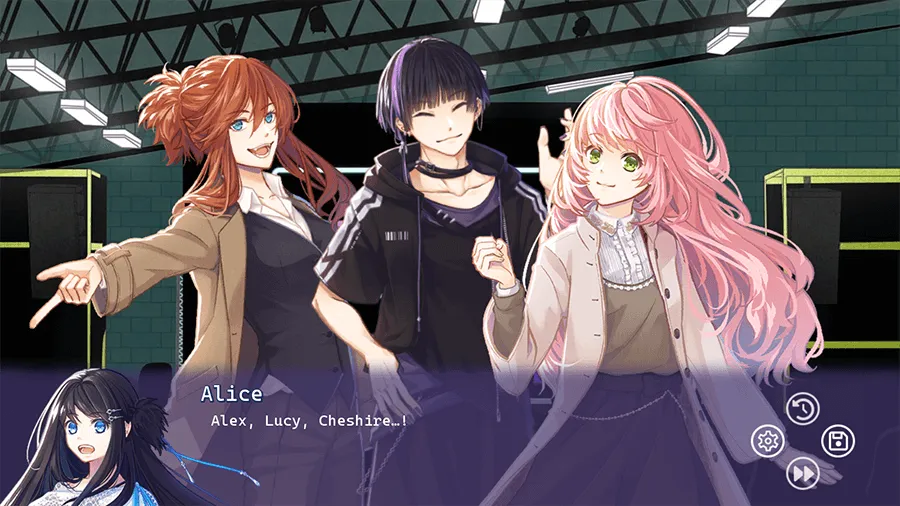

Izumi: “I’m currently thinking about my long-term goals, both for the game and for my brand as a game developer. We’ve been experimenting with a few things, especially after realizing certain aspects about the IP, but the path ahead is still uncertain. For now, I’m waiting to see what God has planned for me, which is why I’m calling this an indefinite hiatus. But deep down, I know I still want to make games.”

Izumi: “This is a scrapped CG lineart illustration that was originally meant for Sousuke’s route. However, since the scene turned out to be too similar to one in Harry’s route, we decided to scrap it and rewrite the whole part. This was the original illustration before we changed the love interest to Harry. Even the artbook doesn’t include this one, so this is the first time it’s being shown.”
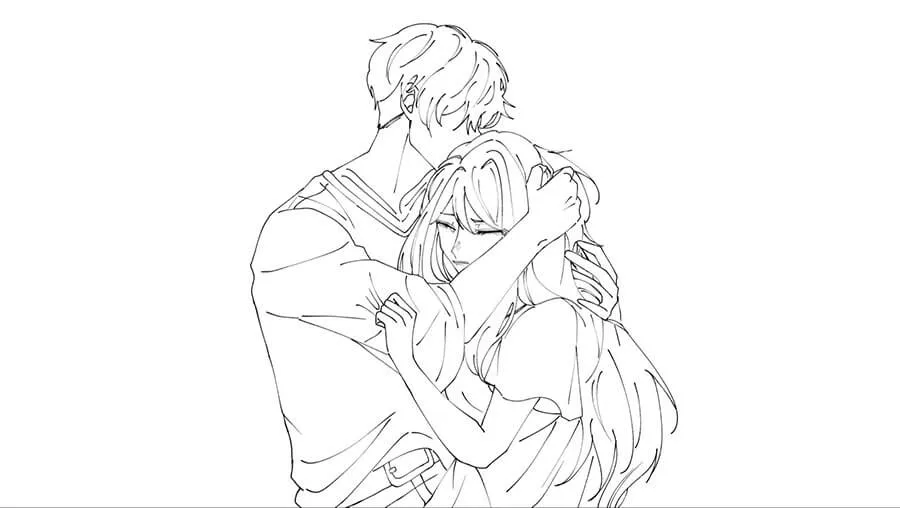

Izumi: “Have grace on yourself. Don’t worry too much. Lean on someone, and never tie your worth to your achievements or wealth. Talents was the first game where I truly felt God carrying me through, despite my limitations and weaknesses. Every achievement Talents received, especially during its development, was all by grace. The awards, the recognitions from prestigious events, and the opportunities that came my way as a game dev were all different from my past projects where I tried to control everything on my own.”
“Trying to control everything only leads to stress and burnout, but I didn’t feel that with Talents. I had little money and no full set of skills, yet I started receiving surprise emails from strangers offering help, each arriving at the perfect time, often right after I had cried out to the Lord the night before. I didn’t use to trust Him this much. I had nothing, but when I surrendered the project into His hands for the first time, miracles happened. Free flights to game events, free accommodations, and free training opportunities. I even met one of the hosts of GDC Pitch himself through coincidence, who came all the way from the USA to the Philippines (my country) for a game dev-related event. GDC Pitch, along with the pitching scenes from the Korean drama Start-Up, served as inspiration for the pitching scenes in Talents. I mean, what are the odds of meeting him in person? It truly felt like being carried, very unlike the times I tried to handle everything on my own.”
“Even a conglomerate showed interest in co-owning the IP after its release, which I eventually turned down due to multiple reasons. And while the reception of the full game was unexpected, especially commercially, which I’m still learning to move on from, I can say that the journey itself was a success. The opportunities, the people I met, the shared experiences that shaped the story, the angels who helped, the hardships, the nerve-wracking moments, and most of all, the path that led me closer to Jesus, all of it was worth it.”
“Looking back, I’m proud of the game we created. I have no regrets, and I wouldn’t change a thing about the process. I’m looking forward to what amazing things we can create next.”

If Izumi’s story and the world of Talents have captured your heart, you can show your support by checking out the full game on Steam. Every download, review, and word of encouragement helps indie creators like Izumi keep telling the stories that move us.
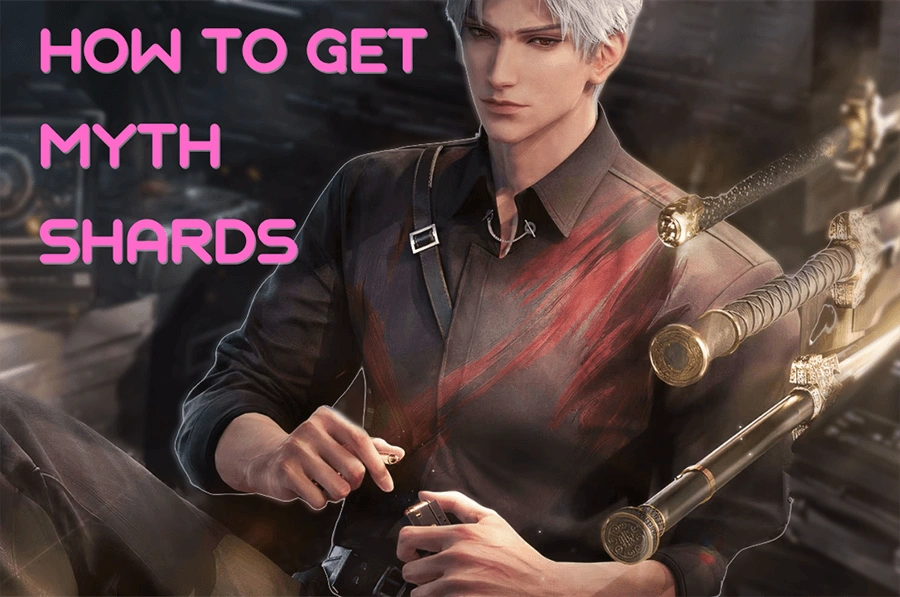
In Love and Deepspace, Myth Shards are your key to unlocking the deeper layers of each love interest’s story. These Myth storylines are rich, multi-chapter...
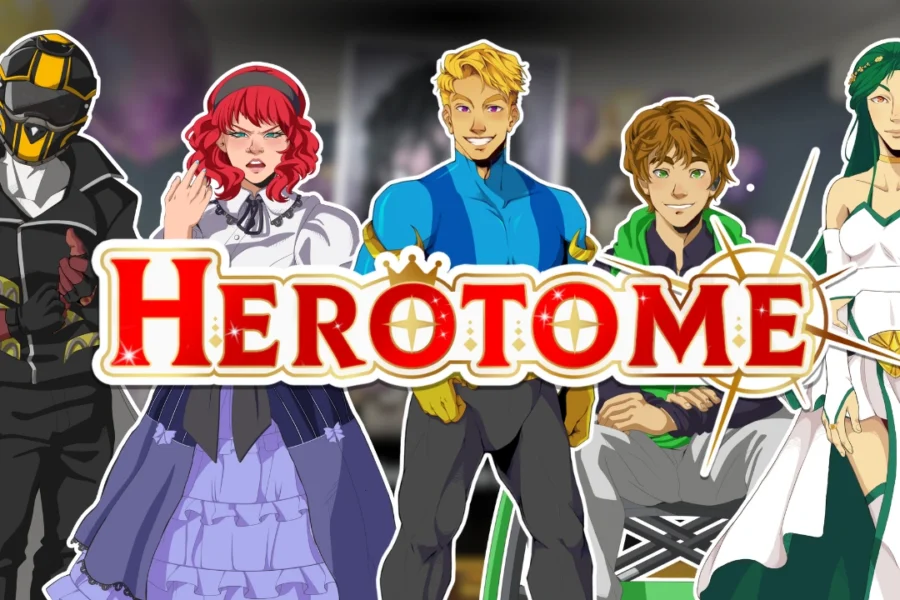
In this special podcast feature, we sit down with Wudge, the solo developer behind Herotome, an urban fantasy visual novel where superheroes not only save...
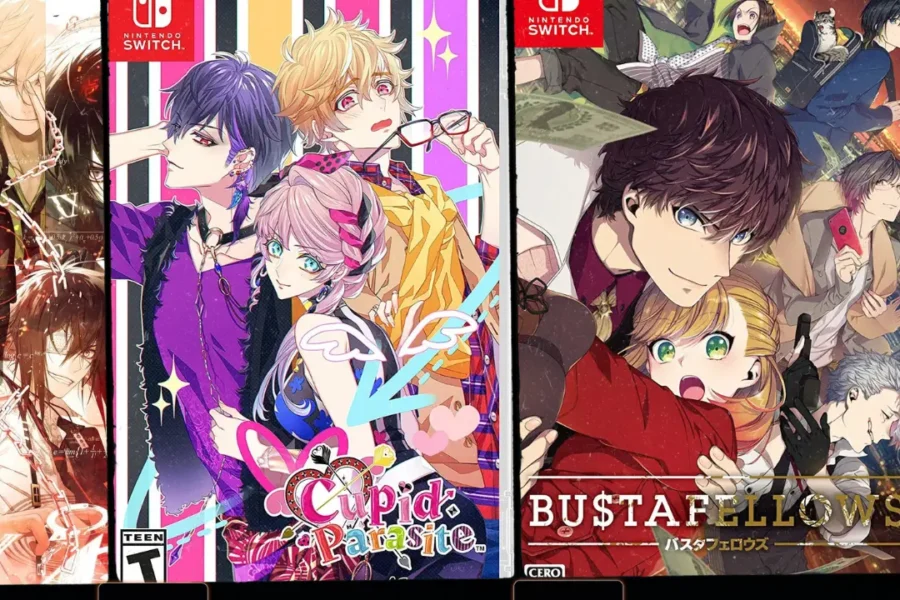
Many players are searching for otome games for women that go beyond high school crushes and teenage drama—games that reflect real-life challenges, deeper emotional connections,...